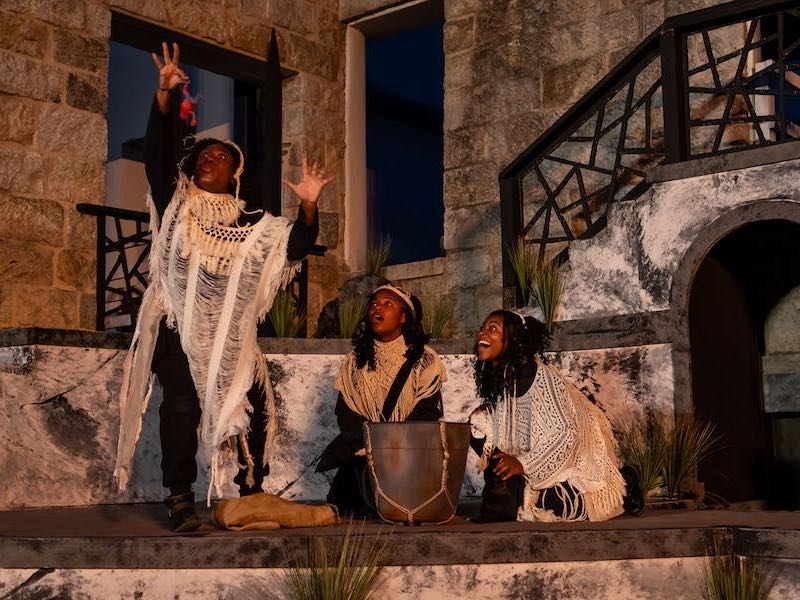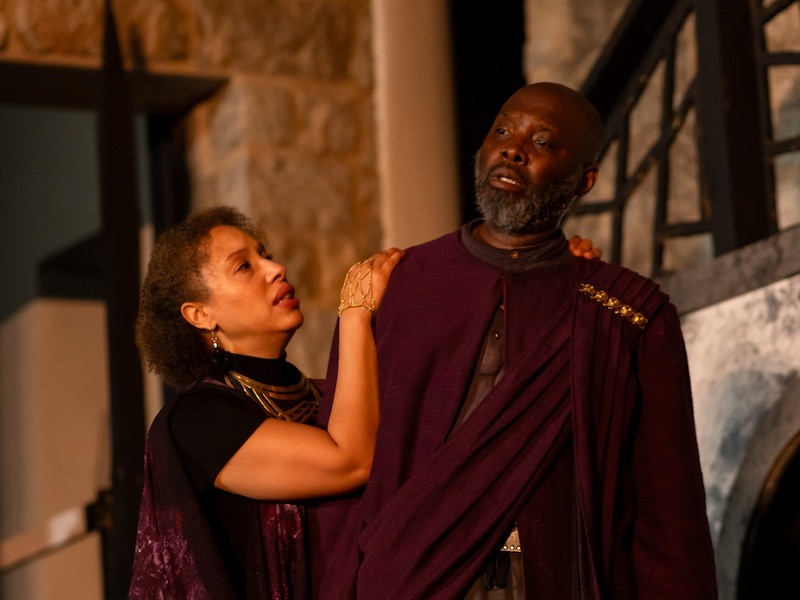By the pricking of my thumb… something wicked(ly good) this way comes. Macbeth, performed by Chesapeake Shakespeare Company’s Black Classical Acting Ensemble and expertly directed by Lauren Davis, is both a powerful production of Shakespeare’s supernatural tragedy and a testament to investing in the training, rehearsal space, and stage time for the next generation of Black actors.
This Shakespeare-in-the-Ruins production feels less a Scotland of mortals, but an otherworldly realm. Staged on the partially reconstructed ruins of the Patapsco Female Institute (a former finishing school for young women) in Ellicott City, this Scotland is already a haunted setting. The multi-tiered stage is built into the ghost of a grand building with skeletal iron beams and rough stone walls highlighting empty window spaces—all used to fantastic effect by set and lighting designer Dan O’Brien. As the outdoor performance began at dusk, we were slowly dropped into darkness like the Macbeths while sound effects by Matthew Dacher—crows, owls, even the Eagles’ “Hotel California”—underscored the eeriness of it all.

But it was the dazzling and unsettling performances of Mecca Verdell, Keri Anderson, and Jordan Stanford as the weird sisters that truly moved us into a land dominated by malevolent spirits. Young and feral, the witches dance through the audience, crawl and howl like beasts, rolling back their eyes and grimacing, and intertwining their bodies to become one three-voiced menacing creature (with movement direction by Mari-Andrea Travis). Wearing white fringed shawls and vests and tiaras of twigs—costume designer Kristina Lambdin mixes the white dress of Haitian voodoo priestesses with a pagan, forest witch touch—the three witches are liminal spirits. (The rest of the cast wear black henley shirts, cargo pants, and boots, with occasional leather vests or scarves indicating different clan colors: The Macbeths both don a wine-red hue.)
Both of this earth and yet not, the weird sisters are imbued with prophetic knowledge and yet petty AF (drowning a sailor because his wife wouldn’t share her chestnuts). When Macbeth (DeJeanette Horne) and Banquo (the stolid Lauren Erica Jackson) stumble upon the witches and learn of their futures, the latter responds rightly with fear and repulsion, but our loyal warlike Macbeth is immediately intrigued and more fearful of his own nature—the capacity to kill—than of their prophecies.
Verdell, Anderson, and Stanford are almost always onstage—maybe not in the guise of the witches, but their wicked presence is omnipresent. They double and double, toil and trouble everything in Macbeth’s life. Verdell becomes a flirty, drunken Porter in one of the tragedy’s few comedic moments (and the sinners knocking on Hell’s gate have been updated to corrupt Baltimore politicians and oil company executives); Stanford plays Macbeth’s most loyal and oldest servant Seyton by hunching over and using a cane; and Anderson performs the lead murderer. But these witches are also messengers, servants, and soldiers, or as Lady Macbeth would say “doubled and then doubled again.” The three reunite as the three murderers who kill Banquo and slaughter Macduff’s family.
Even in the mortal realm, the play is one of violence and fraught masculinity. “What bloody man is this?” King Duncan (Gregory Burgess) asks early on as the injured warrior Macduff (Lloyd Ekpe) enters to tell of Macbeth’s heroic deeds. But the true answer to that question is: All of them. All the men of the play are “in blood stepped so far.” There are multiple wars, assassinations, secret murders, and the brutal killing of innocent women and children. When Macbeth kills his final foe before Macduff’s revenge, the young Siward (Christen Gross) dies at the cusp of adulthood, but as all his wounds demonstrate that he died facing his enemy, he is remembered as yet another brave and bloody man. Likewise, when Macduff enters with Macbeth’s head in a bag, his hands are stained just like the Macbeths’ hands before him. Only the old good King Duncan—played with paternal warmth and kingly grace by Burgess—may not have a murderous rage, but Lady Macbeth (Dawn Thomas Reidy) laments, “Who knew the old man had so much blood in him?”

At the center of all this are Horne as Macbeth and Reidy as Lady Macbeth. Reidy is a confident Lady Macbeth who does not need to needle her husband. She knows that they are both ambitious and have the same shared goals for power; he just needs a little more convincing. It has long been tradition to double the roles of Lady Macbeth and Hecate, but when she appears onstage masked and donning a white branch crown, it is difficult to know if this is the goddess of witchcraft or Lady Macbeth fully coming into her own (after calling upon evil spirits to inspire her cruelty in an earlier scene). When Macbeth decides to dispatch Banquo and son Fleance, she tries to dissuade him from further crimes and it is her husband’s senseless killing of Macduff’s family that seems to be her ultimate undoing.
Horne is a thrill to watch as Macbeth, a man of action on the battlefield but also one tortured by his own warlike deeds when he is alone or confiding in his wife. Even after the murder of Duncan, the mesmerizing Horne keeps a grasp on Macbeth’s humanity, as ruined and defiled as it is. As he is haunted by visions—an invisible dagger pointing him to regicide and a disemboweled Banquo appearing at a feast—Horne develops the slightest tremor in his hand, and shows the mental and spiritual weakness that allows Macduff to defeat him.
This is a play of not only masculine violence and action but of depth of feeling, too. This may be most apparent in the most moving scene of the play when Macduff learns of his family’s fate. Ekpe as Macduff, Gross as his cousin Ross (who delivers the bad news), and the rightful Scottish prince Malcolm played by Shaquan Pearson—all had tears streaming down their cheeks. Macduff is spurred to action and says as he wipes his face, “But I must also feel it as a man.”

Director Lauren Davis deftly teases out these questions of manhood, action, emotion, and the duality of all people to do good or evil. And there are many aspects commending this production. The effective doubling of the skilled cast makes scenes and characters echo in exciting new ways: Jackson plays both Banquo but also the protective mother Lady Macduff in scenes that pair her with Jabari Williams as Fleance and Young Macduff, respectively, who sees his parent murdered and then (alternately) escapes or suffers the same fate. While dealing with the darkness of vaulting ambition, Davis also delivers a powerful play full of danger—from both supernatural and human foes—and action with deadly duels (choreographed by Gerrad Alex Taylor), and in the final sequence large shadows of jousting warriors are cast across the tall stone walls. Both before the play and during intermission, the cast performed acapella versions of relevant songs such as The Rolling Stones’ “Paint It Black,” The Eurythmics’ “Sweet Dreams,” and Black spirituals. And, finally, the majority of the cast was young and vibrant and new to Chesapeake Shakespeare Company’s stages
While applauding the efforts of all the cast, creative team, and crew for this production, the formation of the Black Classical Acting Ensemble and this stellar production shows how the Chesapeake Shakespeare Company is doing the work to become more equitable and representative of and for its community. To create a Black Classical Acting Ensemble in a majority Black city such as Baltimore is to see, listen to, and acknowledge the artists, actors, and designers who are already making classical theater, but also to support and train those who may have been historically underserved, underrepresented, or felt unwelcome by the weight and legacy of Shakespeare as a cultural institution. It’s still a nascent program, but full of promise and absolutely vital for Baltimore’s theater community.
In an opening note about the Black Classical Acting Ensemble, CSC’s Producing Executive Director Lesley Malin offers the brief history that the BCAE was developed in 2021 with Troy Jennings, Dawn Thomas Reidy, and Gerrad Alex Taylor as the current leadership team. Created as an affinity space for Black classical actors and a training ground for new talent, the BCAE has evolved and grown over the last two years with several smaller productions and readings produced in the 2021/22 season, and in this current season—two productions of the Scottish play—one developed specifically for student matinee productions and this enticing Shakespeare-in-the Ruins production. Malin states, too, that the BCAE is already having larger ramifications for the Chesapeake Shakespeare Company: “It has changed how we think about what we produce on our stages, who is leading our productions, and who we are hiring both on and off the stage.”
On Macbeth’s opening night performance with many family members and friends of the cast and crew in attendance, over half the audience were at a CSC production for the first time and it was the most racially diverse CSC audience I have seen. It looked like Baltimore. Seeing Shakespeare reimagined by Black artists is already opening the doors and welcoming new patrons, who may not have seen themselves reflected—or have seen people of color distorted—in the Bard’s works.
Chesapeake Shakespeare Company recently announced its “Season of Rule-Breakers” with As You Like It, A Christmas Carol, Romeo & Juliet, The Oresteia, and The Merry Wives of Windsor all planned for 2023/24, which will feature many of CSC’s actors who comprise the BCAE, and it would be fantastic to see the younger BCAE actors who featured in Macbeth onstage in these mainstage productions, too. In future seasons, I hope we see more full-scale BCAE productions, such as Macbeth.
Running time: Two and a half hours, with one 15-minute intermission.
Macbeth plays through July 23, 2023, at the Patapsco Female Institute Historic Park, 3655 Church Road, Ellicott City, MD. Adult tickets start at $50, tickets for youth under 25 start at $25, and children (two per adult) get in free. Subscriptions and tickets can be purchased by calling 410-244-8570, ordering online, or visiting the Box Office in person, at 7 South Calvert Street, Baltimore, MD.
To learn more about the Black Classical Acting Ensemble, please visit: chesapeakeshakespeare.com/education-community/bcae/
For directions, parking, seating, and other information for the Shakespeare-in-the-Ruins production at PFI Historic Park, please visit: chesapeakeshakespeare.com/plan-your-visit/pfi-historic-park/
COVID Safety: Masks are not required. Social-distance-friendly seating is available. More information is here.
The Cast
MACBETH – DeJeanette Horne
LADY MACBETH – Dawn Thomas Reidy
WITCH/PORTER – Mecca Verdell
WITCH/MURDERER – Keri Anderson
WITCH/SEYTON – Jordan Stanford
DUNCAN/SIWARD – Gregory Burgess
BANQUO/LADY MACDUFF/LENOX – Lauren Jackson
MALCOLM – Shaquan Pearson
DONALBAIN/YOUNG SIWARD – Christen Gross
MACDUFF – Lloyd Ekpe
ROSS – Jasmine Proctor
FLEANCE/YOUNG MACDUFF/DOCTOR – Jabari Williams
The Creative Team
DIRECTOR – Lauren Davis
PRODUCTION MANAGER – Sarah Curnoles
STAGE MANAGER – Lauren Engler
TECHNICAL DIRECTOR/SET & LIGHTING DESIGNER – Dan O’Brien
COSTUME DESIGNER – Kristina Lambdin
SOUND DESIGNER – Matthew Datcher
PROPS DESIGNER – Sierra Ho
MUSIC DIRECTOR – Grace Srinivasan
FIGHT CHOREOGRAPHER – Gerrad Alex Taylor
MOVEMENT CHOREOGRAPHER – Mari Travis
INTIMACY DIRECTOR – Sierra Young
ASSOCIATE TECHNICAL DIRECTOR – Chester Stacy
ASSISTANT DIRECTOR – Ben Lambert
ASSISTANT STAGE MANAGER – Kris DiBastiani
WARDROBE SUPERVISOR – Hannah Brill
TECH MANAGER – Colin Maher
COVID SAFETY MANAGER – Mandy Benedix
SENIOR HOUSE MANAGER – Pamela Forton
HOUSE MANAGERS – Abigail Funk, Stacey Morrison, Ashley Sigmon
INTERNS – Avelina Rivezzo-Weber, Maria Wraback




